Abstract
Generalised aggressive periodontitis is characterised by “generalized interproximal attachment loss affecting atleast three permanent teeth other than first molars and incisors.” The management of generalised aggressive periodontitis is challenging as it involves an interdisciplinary approach. When the patient presents himself late to the clinician, the tooth and bone loss can be up to 60%. Natural teeth and alveolar bone contribute to the contour and aesthetics of the face. Loss of teeth in younger age may lead to attitude, behaviour changes and may cause psychological depression and withdrawal from society. The main distinguishing feature of this case report is the psychological counselling provided along with periodontal and prosthetic treatment.
Background
Aggressive periodontitis generally affects systemically healthy individuals less than 30 years of age, although patients may be older. Aggressive periodontitis may be universally distinguished from chronic periodontitis by the age of onset, the rapid rate of disease progression, nature and composition of the associated subgingival microflora, alteration in the host immune response and familial aggregation of diseased individuals.1 If not diagnosed and treated at an early stage, generalised aggressive periodontitis causes rapid destruction of the tooth supporting structures leading to loss of alveolar bone and teeth up to 60%.2 It is a multifactorial disease where the interplay of microbiological, genetic, immunological and environmental/behavioural risk factors decides the onset, course and severity. The treatment of generalised aggressive periodontitis becomes more challenging when the patient is young and turns to the clinician at an advanced stage of the disease as it involves multiple tooth loss or requires multiple tooth extraction. The emotional effects of tooth loss are devastating for some patients and have a negative impact on their life.3 Psychological counselling is perhaps the least recognised and the most underestimated aspect in the total rehabilitation of a patient with generalised aggressive periodontitis presenting with multiple tooth loss and advanced periodontal destruction.
Case presentation
A 28-year-old man reported with a symptom of mobility of the teeth in relation to all four quadrants. On clinical examination, generalised bleeding on probing (figure 1), generalised deep pockets, generalised grade III mobility, generalised grade I gingival recession (figure 2) and pathological migration in relation to the first quadrant were present (figure 3). The missing teeth were numbers 16, 26, 35, 36, 37 and 46. The dental and medical history was unremarkable to the diagnosis except in respect of the history of mobility of all the teeth since the past 1 year. The patient's oral hygiene maintenance was poor. Plaque and calculus were present, but the amount of plaque was not commensurate with the amount of tissue destruction. Family medical history was also unremarkable to the diagnosis
Figure 1.
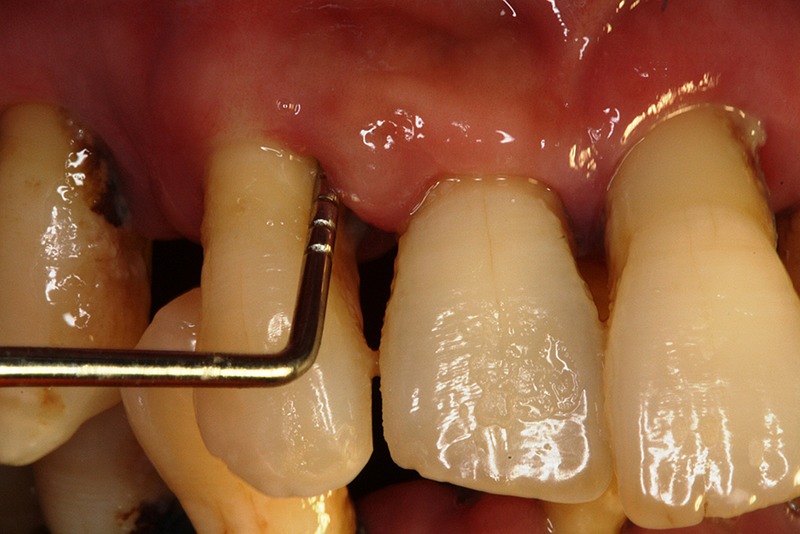
Deep periodontal pocket.
Figure 2.
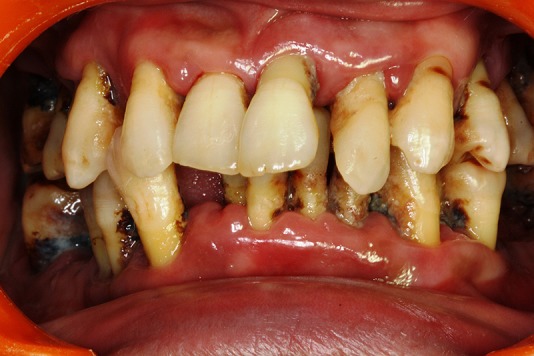
Generalised gingival recession.
Figure 3.
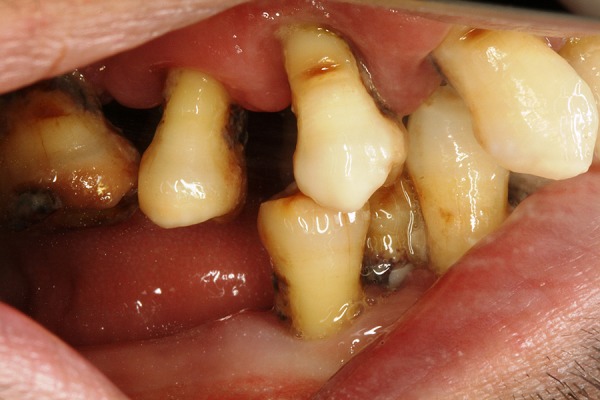
Pathological migration.
The patient was accompanied by his mother who provided the social history to the clinician. It was mentioned that the patient's attitude, behaviour and food intake had changed and that he was suffering from psychological depression and withdrawal from society. The change in social history coincided with the onset of generalised aggressive periodontitis.
Investigations
Orthopantomography revealed advanced bone loss affecting the majority of teeth in the dentition (figure 4).
Figure 4.
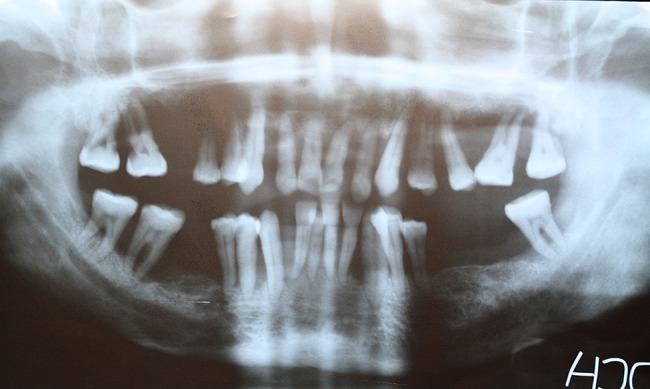
Advanced bone loss affecting the majority of the teeth.
Complete blood count, bleeding time and clotting time were performed to rule out any infections and bleeding disorders. The results were within the normal range.
Treatment
Based on the history, clinical examination and radiographic findings, a diagnosis of generalised aggressive periodontitis was made according to the criteria given by the American Academy of Periodontology 1999 classification. As the patient turned up at an advanced stage of the disease, substantial tooth and bone loss was present and all the remaining teeth were indicated for extraction. The patient was convinced to undergo total extraction (figure 5). Before undergoing complete extraction, the patient was referred for psychological counselling to help him cope with further loss of teeth. An immediate complete denture was fabricated and inserted after total extraction until a permanent prosthesis was planned (figure 6). The psychotherapy was carried out at three different levels by a psychotherapist: individual, group and conjoint-family psychotherapy. No medication was prescribed during the therapy.
Figure 5.
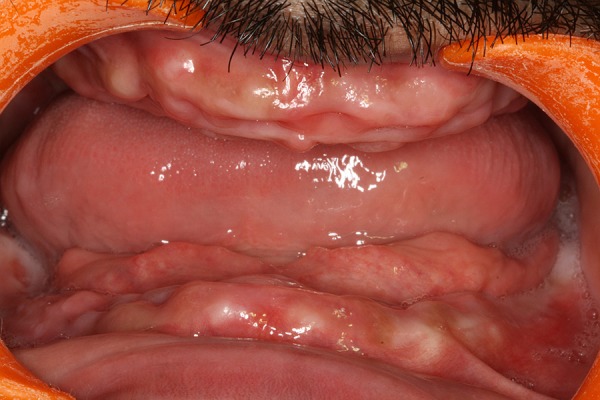
Complete teeth extraction was carried out.
Figure 6.
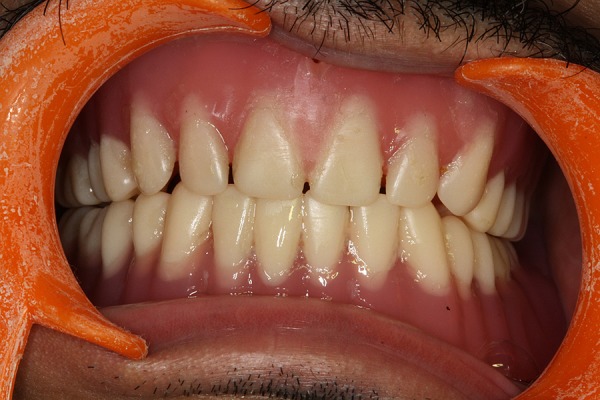
Immediate denture placed.
During individual psychotherapy, counselling was performed on a one-on-one basis to elicit the patient’s attitude and to help the patient understand the effect of the disease and its prognosis. The main objective here is to involve the patient in the treatment process.
In group therapy, the patient was encouraged to meet other generalised aggressive periodontitis patients. The aim was to bring about changes in the behaviour and personality to hasten their rehabilitation in the community.
The goal of conjoint-family psychotherapy is to make the patient’s family aware about the disease and psychological condition of the patient and to encourage them to provide support during the course of treatment.
Outcome and follow-up
The healing following complete extraction was uneventful. At 1 month follow-up, it was interesting to note that the patient was showing a positive attitude and behaviour.
Discussion
The key to successful treatment of generalised aggressive periodontitis is early diagnosis and treatment to prevent further progression of the disease. Unfortunately, the patient turned up at a stage where advanced bone resorption had occurred and the only treatment option was complete extraction followed by full mouth prosthetic rehabilitation. As the patient was young and aesthetics was as important as function, an immediate denture was provided after extraction till a permanent prosthesis was planned. Psychotherapy has a very positive effect on the attitude and behaviour of the patient and should be continued depending on the psychological status of the patient. A recent study reported that psychotherapy offered to a generalised aggressive periodontitis patient had a positive psychological effect that restored their ability to socialise in their environment, contributing to their positive experiences in life, which enhanced the role of special psychological care in a multidisciplinary approach in the treatment of a case of generalised aggressive periodontitis.4 5
Learning points.
Generalised aggressive periodontitis causes rapid destruction of the tooth supporting structures leading to substantial loss of alveolar bone and teeth.
Early diagnosis plays an important role in saving a substantial amount of alveolar bone and teeth.
The treatment plan for generalised aggressive periodontitis should also include a psychological approach.
Footnotes
Contributors: DP and PN contributed to the conception and design, acquisition of data and interpretation. ND and AD contributed to the drafting of the article and its critical revision for important intellectual content. DP contributed to the final approval of the version to be published.
Competing interests: None.
Patient consent: Obtained.
Provenance and peer review: Not commissioned; externally peer reviewed.
References
- 1.Hart TC. Genetic risk factors for early-onset periodontitis. J Periodontol 1996;67:355. [DOI] [PubMed] [Google Scholar]
- 2.Page RC, Altman LC, Ebersole JL, et al. Rapidly progressive periodontitis. A distinct clinical condition. J Periodontol 1983;54:197. [DOI] [PubMed] [Google Scholar]
- 3.Davis DM, Fiske J, Scott B, et al. The emotional effect of tooth loss: a preliminary quantitative study. Br Dent J 2000;188:503–6 [DOI] [PubMed] [Google Scholar]
- 4.Dosumu OO, Dosumu EB, Arowojolu MO, et al. Rehabilitative management offered Nigerian localized and generalized aggressive periodontitis patients. J Contemp Dent Pract 2005;6:40–52 [PubMed] [Google Scholar]
- 5.Roshna T, Nandkumar K. Generalized aggressive periodontitis and its treatment option: case reports review of literature. Case Rep Med 2012;2012:535321. [DOI] [PMC free article] [PubMed] [Google Scholar]


